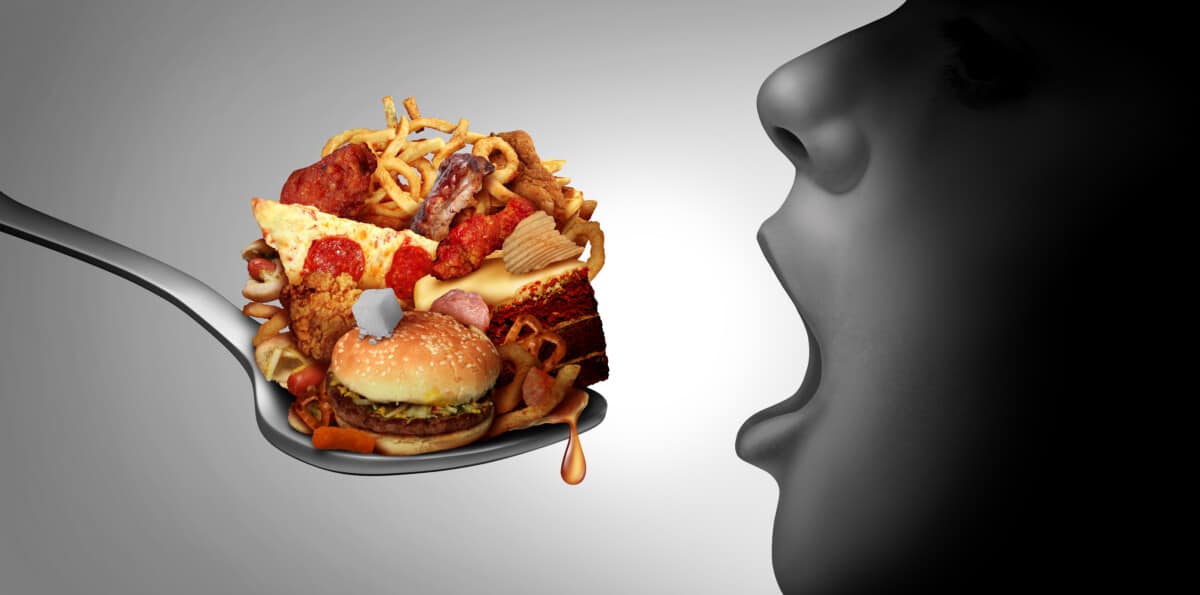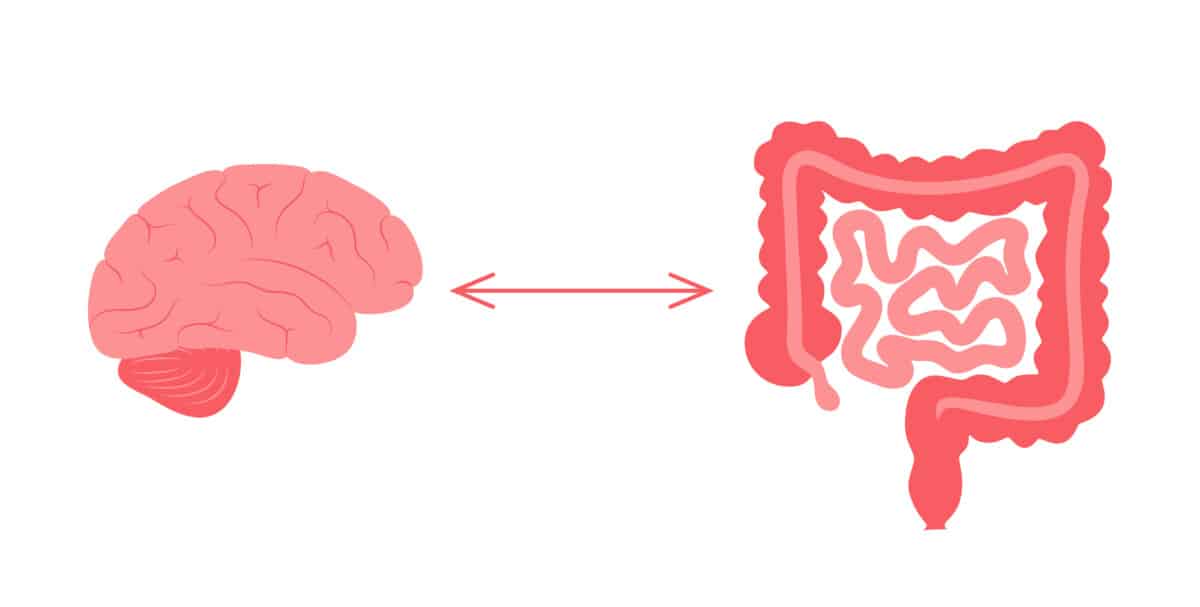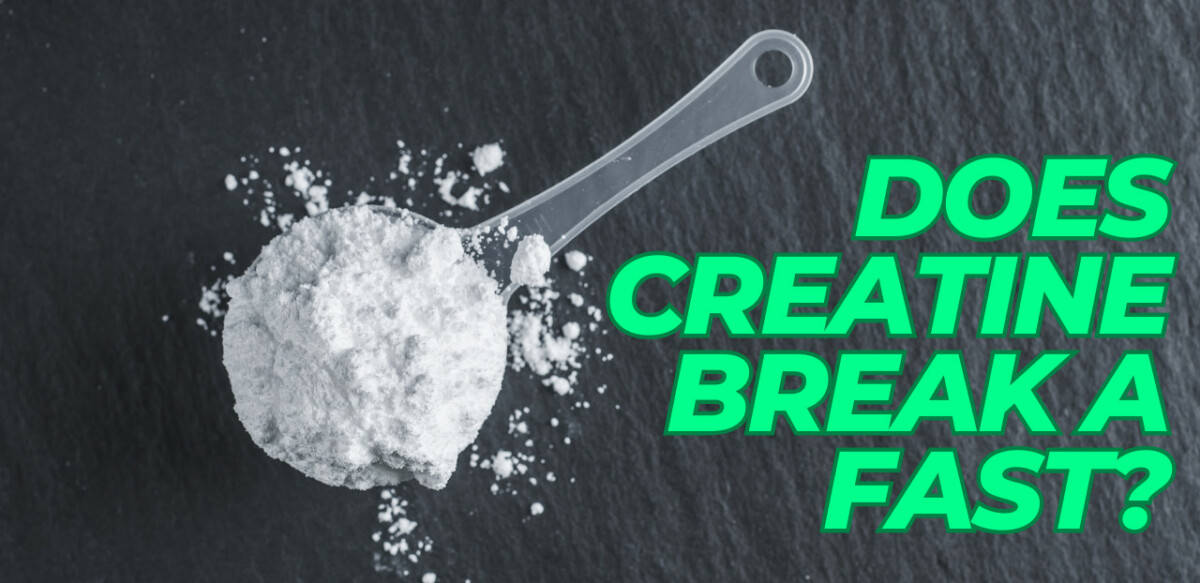If you’re a female who’s suddenly found yourself hungry all the time, you’ll find out why and how to curb this hunger so you can still lose weight.
Many people (primarily women) have found themselves suddenly getting ravenously hungry to the point they feel starving. Even stranger, they may not have changed anything with their diet or exercise. Yet they’re now getting this sudden onset of starving hunger.
The hunger can get so bad that your stomach is growling, and you can’t concentrate. And even more strange, you can still be starving even if your weight has increased. There are some simple explanations for this sudden shift in your appetite.
Once you get to the root of the problem, you can make some simple changes to your diet so you don’t always feel so hungry. Here, you’ll uncover the causes of this sudden extreme hunger and how to fix it so you can get back your weight loss.
What Causes a Woman to Feel Hungry All the Time

Hormonal issues and imbalances are the main reasons you’re suddenly much hungrier than usual. Your hormones control your hunger, so they’re usually the root cause behind why you’re feeling this extreme hunger suddenly.
So, what causes this sudden hunger in the body?
Your body’s survival mechanisms are the hormonal root cause of why you feel hungry. Your body sends hormonal signals to trigger the feelings of hunger, so you search for food.1 This was very useful for our caveman ancestors; otherwise, we would only be so motivated to search for food with hunger.
But nowadays, feeling hungry can quickly lead to weight gain since eating high-calorie foods is so easy. Of course, our ancestors didn’t have quick access to an unlimited amount of food, but we do and still carry these same genes.
Age, diet, and other lifestyle factors significantly impact the hormones that regulate your appetite.
Let’s look into why…
Key Takeaways:
- Hormonal imbalances often cause sudden increased hunger.
- Hormones regulate our hunger signals.
- These signals evolved as survival mechanisms for seeking food, but modern access to high-calorie foods can lead to weight gain with this ancient mechanism.
Why You’re Suddenly Much Hungrier Than Usual

If you feel hungrier than usual, your hormones are likely out of balance. There are a lot of age, diet, and lifestyle factors that can cause an increased appetite.
For a woman, these are some of the most typical causes for hormone imbalances that result in increased hunger and appetite.
- Menstrual cycle
- Pregnancy
- Polycystic Ovary Syndrome (PCOS)
- Perimenopause and Menopause
- Thyroid issues
- Stress
- Medications
- Insulin resistance
- Ghrelin and Leptin imbalance
- Lack of sleep
- Poor dietary choices
The above factors can all influence hormonal imbalances and increase hunger and appetite. These factors can create a cascading effect of hormonal imbalances in your body. So it could be one of the above causing your sudden hunger as a female.
Still, it could also be multiple factors combined to create a bigger effect.
Menstrual Cycle
Some women may crave high-carb or sugary foods during certain phases of their menstrual cycle.2 If combined with stress-driven cravings and poor dietary choices, this can lead to a magnified effect on hunger, blood sugar levels, and weight gain.
Many women experience increased hunger and cravings during the luteal phase, particularly for carbohydrates and sweets.3 This is often the phase where appetite is the most intense. Elevated progesterone can lead to symptoms like bloating, mood swings, and fatigue, influencing eating behaviors.4
Additionally, serotonin levels can fluctuate during this phase, leading to carbohydrate cravings since carb intake can boost serotonin production, a neurotransmitter associated with well-being and happiness.5
Pregnancy
When a woman becomes pregnant, her body undergoes many changes, resulting in excessive hunger. As the baby grows inside the mom, her body needs more calories and energy. So it makes sense she’ll feel like eating more.
Pregnancy brings hormonal surges from a wave of new hormones. Some of these, like progesterone, can make a woman feel hungrier. Prolactin is another hormone that prepares the body for breastfeeding and increases appetite.
Polycystic Ovary Syndrome (PCOS)
PCOS is a hormonal condition in women that causes increased hunger and appetite.6 PCOS causes the body to have trouble using insulin, a vital hormone that helps your cells get energy from sugar in the blood.7
When insulin doesn’t work the way it should, the body thinks it needs more energy, resulting in hunger pangs. Then, your body could produce more insulin to try and fix the problem. High insulin levels could cause even more hunger and cravings, especially for sugary and carb-rich foods.
Many women with PCOS gain weight, and when your body is heavier, it craves more calories to maintain. This makes it a difficult battle to try and lose weight when the body is always hungry.8
Perimenopause and Menopause
Perimenopause and menopause are phases in a woman’s life when reproductive hormones decline. This usually results in hormonal changes that cause increased hunger. Perimenopause can start in a woman’s early 40s, and menopause is typical in her 50s.
As a woman approaches menopause, levels of estrogen decline. Estrogen plays a vital role in managing hunger and metabolism. With decreased estrogen levels, a woman usually feels suddenly hungry all the time.9
Metabolisms slow down during perimenopause and menopause, resulting in the body burning calories more slowly. So she’ll probably still gain weight even if she’s not eating more than usual.10
Mood changes also happen due to perimenopause and menopause, which can cause anxiety and depression. For some, eating more comfort foods can help to cope with these feelings. And many menopausal women have problems sleeping, which can cause increased hunger pangs.11
Thyroid Issues
When a woman’s thyroid isn’t working correctly, it could cause hormonal disruptions, resulting in extreme hunger. Hyperthyroidism is when the thyroid is too active and produces more thyroid hormones than needed.
These hormones can speed up the metabolism, which may sound like a good thing, but it also results in the woman feeling excessive hunger and carb cravings because the body thinks it needs more energy.12 The body’s metabolism has gone into overdrive, causing increased hunger.
Stress
Stress is a powerful driver of hunger and the foods you crave. Stress hormones like cortisol can increase your appetite and promote fat storage, especially in troublesome areas like the belly.13
Many crave more comfort foods when stressed. Craving comfort foods that are sugary, fatty, and salty foods can help to relieve your body from stress.
When stressed, your sleep can also suffer, causing you to feel tired the next day. Sleep loss and stress create a hunger cycle, causing constant hunger and craving unhealthy foods.
Here is how stress can disrupt major hormones that influence hunger and cravings…
Cortisol – The “Stress Hormone”
Cortisol is often called the “stress hormone” because your body releases it in response to stress. One of its functions is to raise blood sugar levels to prepare the body for a “fight or flight” response.13
Chronic stress can cause consistently high cortisol levels, leading to insulin resistance. Cortisol signals for the body to release more glucose for quick energy. But if this energy isn’t used (because you’re not fleeing from threats like a sabertooth tiger), insulin must be released to bring your blood sugar back down.
When your blood sugar dips, your hunger and cravings will naturally increase to bring it back up to normal levels. High cortisol levels have been found to promote belly fat storage. Increased visceral belly fat can produce hormones and inflammation, further elevating insulin resistance.
Lowering stress can help to keep your cortisol levels in balance. Also, take adaptogens that help your body resist and cope with stressors. They’ve been used for centuries in Ayurvedic and Chinese herbal traditional medicines. Many super greens powders contain adaptogens.
Insulin – The “Fat Storage Hormone”
Insulin is a hormone that helps to regulate blood sugar levels. Eating too many sugars, carbs, starches, and other high-glycemic foods over time can cause you to develop insulin resistance. This can result in an increased appetite, leading to weight gain.14
Insulin resistance occurs when cells in your body no longer respond well to insulin and can’t use glucose in your bloodstream for energy. This can increase hunger and cravings since your body thinks it hasn’t consumed enough energy.
When your blood sugar drops rapidly due to insulin resistance, you’ll crave sugars and rich carbs to return it quickly. Your body can store these excess sugars from your bloodstream as fat into stubborn body parts like your belly, hips, thighs, and arms.
A low-carb diet combined with intermittent fasting will regulate your insulin levels. Add C8 MCT powder to your intermittent fasting routine for better results.
Support Many of the Keto Benefits Associated With Increased Ketones, & Support Them FAST, but Without the Difficulty of Doing Keto...
Increase Ketone Levels Inside Your Body to Boost Metabolism, Elevate Energy & Enhance Mental Focus
- 3X Better Than Coconut Oil, Butter or MCTs
- Heightened energy levels
- Reduced cravings & appetite
- Graceful aging
- Healthy metabolism
- Increased mental clarity & focus
- Heightened physical performance and recovery
Ghrelin – The “Hunger Hormone”
Ghrelin is a hormone responsible for triggering hunger in the body. It’s produced in the stomach and released when the stomach is empty. Ghrelin signals to the brain that it is time to eat and will increase your appetite.15
After eating a meal, your ghrelin levels should naturally decrease. This signals your hunger levels to drop. This is why it’s a good idea to wait 10-15 minutes after eating a meal before returning for seconds. It might take a little time for your ghrelin levels to decrease after eating.
What can affect your ghrelin levels?
- Lack of sleep
- Poor diet
- Body weight
- Gut health
Bad gut health can lead to unbalanced ghrelin levels, causing you to feel hungrier more often.16 The gut-brain axis is the communication between your gut and your brain.
This communication works as hormones and nerve signals go back and forth. The gut-brain axis regulates many bodily functions, such as appetite, immunity, and mood.

Your body may not properly digest and absorb foods with poor gut health. This can lead to micronutrient deficiencies and leaky gut syndrome. Your body may raise ghrelin levels to make up for this perceived malnourishment.
Making sure your gut is healthy should be a top priority to reduce hunger. Otherwise, you’ll be fighting an uphill battle against elevated ghrelin levels. A quality greens powder contains gut-boosting ingredients like probiotics, prebiotics, and digestive enzymes.
Leptin – The “Fat Controller Hormone”
Leptin is a hormone responsible for suppressing hunger in the body. It’s produced by your fat cells and tells your brain how much energy you have stored.
When you have plenty of fat in your body, your leptin levels are high, encouraging your body to lower hunger to keep your body weight in balance. Those overweight should have more leptin circulating in their bloodstream than those underweight.
Low leptin levels will signal your brain to increase appetite since it needs energy intake.17 Leptin increases metabolism, so your body burns off fat for energy more freely. If you become underweight, restrict calories, or even start losing too much weight, your leptin levels could lower, causing you to feel hungrier.
Leptin resistance occurs when the hypothalamus part of your brain has difficulty receiving the leptin signal to stop eating. There might be enough leptin in your body, but those overweight and obese could have a harder time recognizing and responding to the leptin signal properly.18
If you restrict your calories too much for too long, your leptin levels will decrease, and your ghrelin will increase. This is why it might be a good idea to add in a cheat meal to kickstart your metabolism strategically. Busting out of a plateau like this is also known as the whoosh effect.
Lack of Sleep
Not getting enough sleep can cause an increase in hunger and significantly impact the hormones cortisol, insulin, ghrelin, and leptin.19 Lack of sleep and disrupted sleep patterns negatively affect the hormones that impact your hunger and cravings:
- Increased cortisol
- Lower insulin sensitivity
- Increased ghrelin
- Decreased leptin
Sleep deprivation also reduces self-control, making it easier to binge eat junk foods.20 Studies have also found that we crave sugary, high-fat, and carb-rich foods like pizza when sleep-deprived.21
If you wake up and feel extremely hungry, you may not have had enough to eat the night before. Sleep is when your body detoxes, recovers, and rejuvenates. Without sufficient sleep or nutrients, your body could start signaling feelings of hunger.
If you go to bed hungry… your blood sugar can get really low overnight, causing lousy sleep and feelings of hunger the following morning.
This is why sleeping on an empty stomach is not a good idea. Instead, have a tablespoon or two of unsweetened almond butter to help you feel full before bed.
How to Stop Feeling Hungry All the Time

Based on the above, you can see how various factors can influence you to feel suddenly hungry, whether female or male. However, many females have more difficulty dealing with hunger and cravings than men because of the hormones involved.
Here are some strategies you can use to better manage and reduce the hunger hormones that are causing weight gain…
Limit Sugar and Refined Carbs
The best thing you can do to stop feeling hungry all the time is to eat more natural, real whole foods. Kick out the sugar, starches, refined carbs, processed and junk foods from your diet. They cause hormonal imbalances, poor gut health, and inflammation that leads to appetite increases.
Your carbohydrates should primarily come from vegetables and a little bit of fruit. Consuming more vegetables and some fruit when restricting calories will help fill your stomach with fiber.
Vegetables and some fruits naturally contain a higher amount of fiber. High-fiber foods will make you feel full, provide nutrients, and promote a healthy gut.22 In addition, they’ll fill your stomach when you start dieting without the extra junk. Just make sure you’re only consuming low-sugar fruits like berries.
Artificial sweeteners can also cause you to feel hungrier. They may contain zero calories but still send sweetness signals to the brain. Your body is expecting an influx of calories with this sweetness. And when no calories come in with it, it could cause you to feel hungry.23
Eat More Protein and Healthy Fats
Eating more protein and healthy fats can help to reduce hunger by improving digestion, hormone regulation, and satiety.
It takes longer for your body to digest protein than carbohydrates, which helps you feel fuller for longer.23 Good fats are also digested slower than sugars and carbs, which delay the emptying of your stomach.
Protein improves hormones that play a role in your hunger and fullness. It can increase hormone levels of peptide YY, GLP-1, and cholecystokinin (CCK), all promoting feeling full.24 Fats promote the release of CCK and peptide YY, both hormones that signal fullness to your brain.25
Protein and dietary fats help to slow the absorption of sugars and carbs into your bloodstream. This can prevent rapid blood sugar and insulin spikes that result in low blood sugar. You’ll have more sustained energy and reduce the sudden hunger so soon after eating.
Stay Hydrated
Your body could easily mistake hunger for dehydration. Your body’s signals for thirst and hunger are closely related, and it’s easy for your body to get confused.26
The hypothalamus in your brain regulates hunger and thirst. When you become dehydrated, the hypothalamus might see this as a need for food and drink. This results in you feeling hungry instead of just thirsty.
Decreased blood volume due to dehydration results from the concentration of nutrients in your blood to drop. This can cause your liver to send signals to the brain for hunger.
A good rule of thumb is to drink at least half your body weight (in pounds) in fluid ounces daily. So, if you weigh 160 pounds, you should drink at least 80 fluid ounces daily.
Improve Sleep Patterns
Sleep quality needs to be prioritized to get your hunger down. Improving your sleep quality and patterns will positively affect your hunger and cravings.
Go to bed and wake up at the same time every day to regulate your body’s internal clock. Avoid caffeine in the afternoons and alcohol in the evenings. Alcohol might help some fall asleep faster, but the sleep quality is lower due to REM disruptions.27
Try to make your bedroom a dark, quiet, and cool environment conducive to sleep. Limit screen time before bed, try not to eat a big meal before bed, use relaxation techniques, and be more active during the day can improve your sleep quality.
Manage Stress
Lowering your stress levels is vital to reducing your hunger. Your body has an evolutionary drive to ensure survival, so it’ll increase hunger for sugary carb-rich foods when you’re stressed out.
Physical activity and regular exercise are some of the most effective ways to manage stress because they release natural mood-boosting endorphins. Mindfulness, meditation, and deep breathing exercises can help to reduce anxiety and stress.
Limiting caffeine and sugar will help to lower the stress hormone cortisol. A healthy diet can reduce food cravings by reducing low blood sugar fluctuations and inflammation.
Adaptogenic herbs like ashwagandha, rhodiola, and holy basil can help the body resist stressors.28 You can find these adaptogens in a greens powder like Metabogreens.
Conclusion
Extreme sudden hunger can be a total pain since it’ll derail your results and cause you to binge eat all day. Unfortunately, you may be experiencing this crazy hunger despite zero changes to your diet or exercise routine.
The root cause of this increase in hunger is mainly hormonal. Your hormones control your appetite, which can lead to cravings when they become imbalanced. Therefore, getting your hormones under control is paramount to getting your hunger under control.
Lifestyle and diet factors play a significant role in hormonal fluctuations. Even in a calorie deficit, eating bad foods could cause inflammation and hormonal imbalances, leading to hunger increases. It’s best to focus on your diet and lifestyle factors, such as improving your sleep quality and lowering stress, to get the best results.
Now that you know how to get your hormones under control, it’s what you’ll need to get your food intake under control. But with this knowledge, you should now have better appetite control, which will get you right back progressing on the weight loss goals.
Josh holds a Bachelor’s degree in Exercise Physiology and Nutrition Science. He’s a Certified Strength and Conditioning Specialist (CSCS) by the National Strength and Conditioning Association and he’s a Certified Personal Trainer (CPT) by American Council on Exercise. He’s worked as a Strength and Conditioning Coach at the high school and college levels. He has over 15 years of experience as a personal trainer and nutrition coach. He strives to bring inspiration and results for people to live healthier lives through smart diet and exercise.











